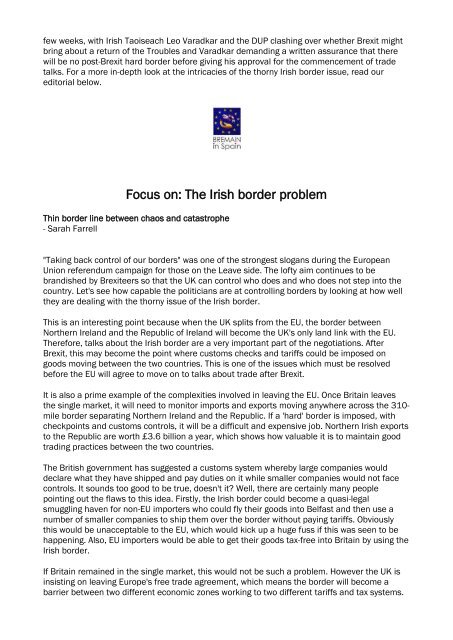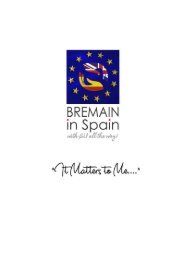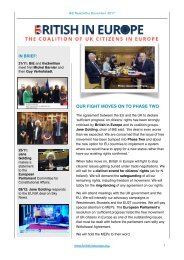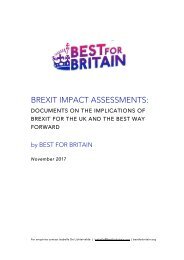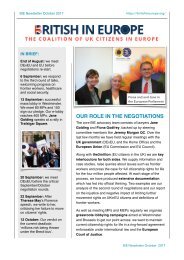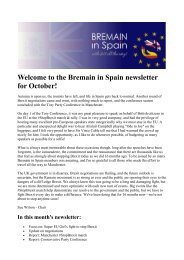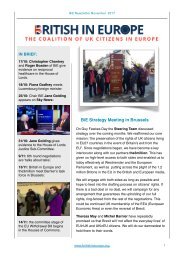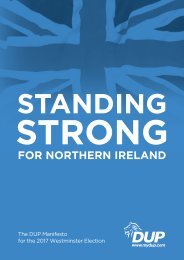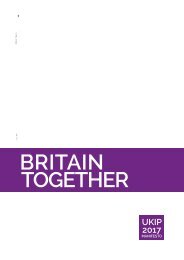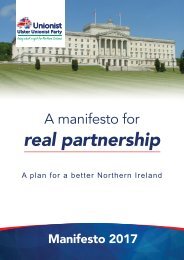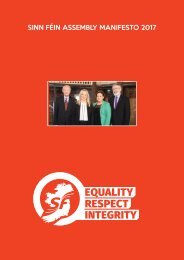November Newsletter
You also want an ePaper? Increase the reach of your titles
YUMPU automatically turns print PDFs into web optimized ePapers that Google loves.
few weeks, with Irish Taoiseach Leo Varadkar and the DUP clashing over whether Brexit might<br />
bring about a return of the Troubles and Varadkar demanding a written assurance that there<br />
will be no post-Brexit hard border before giving his approval for the commencement of trade<br />
talks. For a more in-depth look at the intricacies of the thorny Irish border issue, read our<br />
editorial below.<br />
Focus on: The Irish border problem<br />
Thin border line between chaos and catastrophe<br />
- Sarah Farrell<br />
"Taking back control of our borders" was one of the strongest slogans during the European<br />
Union referendum campaign for those on the Leave side. The lofty aim continues to be<br />
brandished by Brexiteers so that the UK can control who does and who does not step into the<br />
country. Let's see how capable the politicians are at controlling borders by looking at how well<br />
they are dealing with the thorny issue of the Irish border.<br />
This is an interesting point because when the UK splits from the EU, the border between<br />
Northern Ireland and the Republic of Ireland will become the UK's only land link with the EU.<br />
Therefore, talks about the Irish border are a very important part of the negotiations. After<br />
Brexit, this may become the point where customs checks and tariffs could be imposed on<br />
goods moving between the two countries. This is one of the issues which must be resolved<br />
before the EU will agree to move on to talks about trade after Brexit.<br />
It is also a prime example of the complexities involved in leaving the EU. Once Britain leaves<br />
the single market, it will need to monitor imports and exports moving anywhere across the 310-<br />
mile border separating Northern Ireland and the Republic. If a 'hard' border is imposed, with<br />
checkpoints and customs controls, it will be a difficult and expensive job. Northern Irish exports<br />
to the Republic are worth £3.6 billion a year, which shows how valuable it is to maintain good<br />
trading practices between the two countries.<br />
The British government has suggested a customs system whereby large companies would<br />
declare what they have shipped and pay duties on it while smaller companies would not face<br />
controls. It sounds too good to be true, doesn't it? Well, there are certainly many people<br />
pointing out the flaws to this idea. Firstly, the Irish border could become a quasi-legal<br />
smuggling haven for non-EU importers who could fly their goods into Belfast and then use a<br />
number of smaller companies to ship them over the border without paying tariffs. Obviously<br />
this would be unacceptable to the EU, which would kick up a huge fuss if this was seen to be<br />
happening. Also, EU importers would be able to get their goods tax-free into Britain by using the<br />
Irish border.<br />
If Britain remained in the single market, this would not be such a problem. However the UK is<br />
insisting on leaving Europe's free trade agreement, which means the border will become a<br />
barrier between two different economic zones working to two different tariffs and tax systems.


